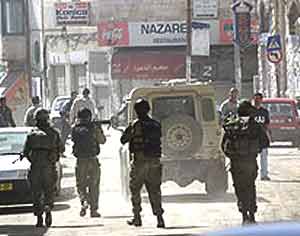| Palestinians were using
firearms and grenades, and the Israelis were using helicopters, machine
guns and tanks. In Jenin, the IDF said an officer and two soldiers
were killed at the refugee camp.
Israel has said the campaign
is aimed at destroying the Palestinian terrorist infrastructure. The campaign
began after a wave of suicide bombings by Palestinians, beginning with
the bombing of a crowded restaurant at the beginning of Passover that killed
26 Israelis.
The IDF said it is holding
1,200 Palestinian suspects in connection with terrorism, and it is reopening
Ktziot internment camp in southern Israel's Negev desert for those detained.
Cross-border fighting also
continued Friday between Hezbollah guerrillas in Lebanon and Israeli forces.
U.S. Secretary of State Colin
Powell will leave Sunday for the Middle East on a mission to try to get
Israelis and Palestinians back to the negotiating table, Powell announced
Friday.
Echoing comments made by
President Bush on Thursday, Powell called on Israel to withdraw its forces
from Palestinian cities and said he hopes "the tragic situation we are
seeing in the region on our television sets every day now will soon be
brought to an end."
The man who chaired the international
group that authored the Mitchell peace plan said Israel's military could
make Powell's mission more difficult
"The risk, of course, is
that longer and deeper the incursion goes, the less likely that Secretary
Powell's visit will be successful," said former U.S. Sen. George Mitchell.
Terje Larsen, the U.N. special
envoy to the Middle East, also warned that getting the Palestinians to
end terror attacks is not the only goal of the international community.
"What I do think is at the
core of the problem, which we in a quartet -- that is the European Union,
the U.S., Russia, the U.N. -- will have to say in the next couple of weeks,
is that no cease-fire can take hold unless there are political underpinnings,"
Larsen said.
After a week of being isolated
in his Ramallah compound by Israeli troops, Palestinian leader Yasser Arafat
met there Friday with U.S. Middle East envoy Anthony Zinni, the first international
representative to see Arafat since the Israeli military campaign began.
Zinni persuaded Arafat to
form a committee of senior aides to work with him on a way out of the current
crisis -- but Palestinians said Israel barred the three committee members
from meeting with Zinni late Friday.
"As we have been informed
officially by the American delegation here, Mr. Sharon rejected totally
for such a meeting to take place," said Muhammad Rashid, a top Arafat aide.
Israel had no immediate comment
on the matter.
Meanwhile, between 1,800
and 2,000 pro-Arab protesters rallied in New York's Times Square chanting
anti-Israeli slogans.
In Manama, Bahrain, police
clashed Friday with thousands of demonstrators who had gathered outside
the U.S. Embassy to protest U.S. and Israeli actions in the Mideast.(Full
story)
In Istanbul, Turkey, nearly
4,000 demonstrators gathered outside a mosque Friday to show their support
for Palestinians.
Protests were also reported
in Egypt, Lebanon, Tunisia, Saudi Arabia, Indonesia, and Jordan.

|
